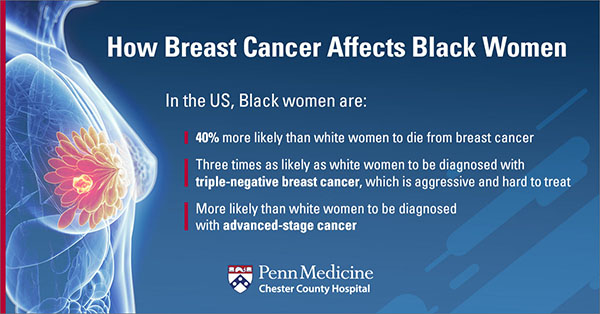
Raise your hand if you look forward to scheduling a cancer screening.
Nobody?
Well, you don't have to look forward to them, but screenings do save lives. And for black women — who are 40% more likely than white women to die from breast cancer despite being diagnosed less — early detection can potentially save their lives.
Breast cancer ranks as the second most-common type of cancer, with about 280,000 women diagnosed in 2022 and an estimated 43,000 dying from the condition the same year.
Treating breast cancer is more likely to be successful when cancer is found in its earliest stages, and regular screening exams like mammograms are the best way to find cancer early. For the past few decades, experts have recommended that women start breast cancer screenings at age 50. But recent research has shown that we need to start screening women — particularly black women — earlier.
Why Do Black Women Need To Be Screened Earlier?
In the US, white women have a slightly higher risk than black, Asian and Hispanic women of developing breast cancer. However, that doesn’t mean that breast cancer affects everyone in the same way.

Since cancer is easier to treat early on, and since black women tend to have more advanced cancer when they are diagnosed, it’s critical to start screening and diagnosing black women at a younger age.
Why Does Breast Cancer Affect Black Women Differently?
There are many reasons why black women may be affected by breast cancer differently. For example, black women are more likely to die from breast cancer because they:
- Tend to have denser breast tissue than white women, which makes breast cancer more difficult to detect
- More often develop aggressive breast cancers, which are harder to treat
- Face barriers to quality medical care, such as lacking transportation, health insurance, or ability to take time off work
This is in addition to the risks that every woman faces, regardless of race, including:
- Family history of cancers
- Genetic test results
- History of radiation treatment
- Breast density
- Weight
- Lifestyle choices such as diet, smoking, and exercise
- Hormone replacement therapy
- Alcohol usage
- History of pregnancy and breastfeeding
So...When Should Black Women Be Screened for Breast Cancer?
Advocacy groups have consistently pushed for earlier screenings for all women. The American Cancer Society recommends that women at average risk of breast cancer start regular mammograms at age 45, with the option to start as early as age 40.
And now, a study published in JAMA Open Network in April 2023 has gone even further, by arguing against one-size-fits-all breast cancer screening guidelines.
In the JAMA study, researchers studied data from more than 400,000 US women who died of breast cancer over the past decade. In sorting data by age and race, they discovered that per every 100,000 women who died in their 40s:
- 27 women were black
- 15 women were white
- 11 women were American Indian, Alaska Native, Hispanic or Asian/Pacific Islander
 "There are reasons why black women have a higher risk of dying from breast cancer," says Maureen D. Hewitt, MD, Abramson Cancer Center, Chester County Hospital. "They are more likely to have triple negative breast cancer -- a more aggressive form of cancer, and are more likely to be diagnosed at a later stage due to factors such as increased breast density and access to care. Addressing access issues and educating black women about the importance of early and regular screening is of utmost importance."
"There are reasons why black women have a higher risk of dying from breast cancer," says Maureen D. Hewitt, MD, Abramson Cancer Center, Chester County Hospital. "They are more likely to have triple negative breast cancer -- a more aggressive form of cancer, and are more likely to be diagnosed at a later stage due to factors such as increased breast density and access to care. Addressing access issues and educating black women about the importance of early and regular screening is of utmost importance."
By screening black women for breast cancer sooner, providers could catch more cancers and potentially lower racial death disparities for this common cancer.
Within weeks of the study's publication, the US Preventative Task Force (the government panel that sets screening guidelines) revised its guidelines for breast cancer screening. The panel's drafted recommendation calls for all women to undergo breast cancer screening every other year beginning at age 40 — a recommendation which could help providers catch breast cancer in black women earlier.
Just remember that every woman is different — and the screening recommendations for one woman might not be the same as they are for you. Talk to your provider about when you should start breast cancer screening.
More About Breast Cancer Screenings:
If you might be at higher risk of breast cancer due to race or other factors, talk with your provider about when you should start screenings, and which diagnostic tools would be best for you.